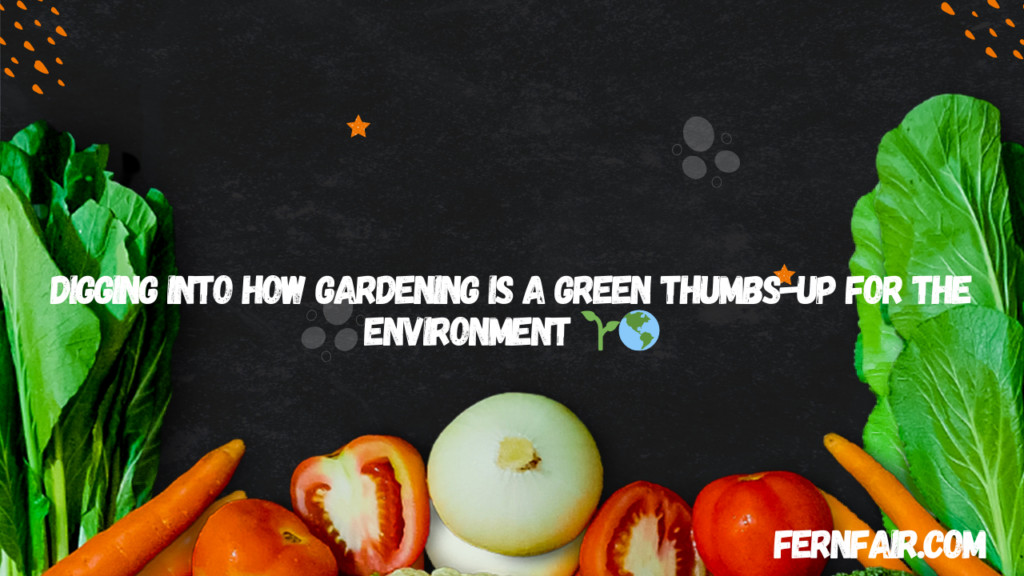Imagine getting your hands dirty, digging into nutrient-rich soil, and watching vibrant flowers and juicy vegetables sprout up before your eyes. While gardening allows you to get outside and cultivate fresh food, did you know it’s also incredibly eco-friendly? Gardening, when done sustainably, is like giving Mother Nature a great big hug.
According to a study by the National Gardening Association, household gardening leads to a 36 million ton reduction of greenhouse gasses each year. That’s the equivalent of taking 6.5 million cars off the road! So put on those muddy gloves and let’s explore the many ways gardening helps the environment.
Why Gardening is an Earthy Endeavor for the Planet

Reducing your carbon footprint is just the start of gardening’s green benefits. Growing your own organic fruits and veggies lessens the environmental impact caused by industrial agriculture’s heavy machinery, excessive pesticide use, and long shipping routes.
Gardens also support local biodiversity and attract all kinds of pollinators like bees, butterflies, and birds. These essential critters help spread seeds and sustain the ecosystem. By avoiding synthetic chemicals in your garden, you create a safe haven for these helpful insects to thrive.
Plus, gardening can help combat soil erosion, a major environmental issue caused by poor agricultural practices that jeopardize soil health and fertility. The roots from your garden plants act as an anchor, preventing soil runoff while their decomposing leaves and stems replenish the earth with nutrients.
And let’s not forget one of the biggest perks – fresh, locally-grown produce at your fingertips! Gardening reduces the carbon emissions from transporting grocery store fruits and veggies across the country (or world). It’s a delicious way to lower your environmental impact.
The Roots of a Sustainable Garden
Creating an eco-friendly outdoor oasis starts with going all-natural through organic gardening practices. Say no to synthetic pesticides and fertilizers, and yes to compost!
Composting transforms your food scraps into a nutrient-rich soil conditioner, reducing landfill waste and negating the need for chemical fertilizers. It’s the ultimate recycling hack for your garden. Pair it with techniques like water-wise drip irrigation, rain barrels, and planting drought-resistant native plants for an ultra-sustainable green space.
Don’t forget to take advantage of Mother Nature’s genius by using companion planting – combining crops that deter pests and diseases naturally. Marigolds, for example, give off a smell that deters nematodes which damage veggie roots. While dill can attract beneficial ladybugs that eat aphids. It’s a prime example of plants’ brilliant give-and-take relationships.
Another fantastic eco-practice is saving seeds from heirloom or open-pollinated plants each year. This ensures you’ll always have locally-adapted, hardy seeds ready to go for next season – no need to purchase new seeds shipped from afar. It’s a sustainable cycle of gardening greatness!
Dig Into These Eco Gardening Tips
Now you know the fundamentals, but there are countless other ways to make your green thumb even greener. Get creative and build raised garden beds using recycled materials like wood pallets or plastic bottles. Or try growing native plants suited to your local climate which require less water and maintenance.
Attracting beneficial insects like ladybugs and lacewings is another savvy eco-strategy. They’ll act as your garden’s own personal pest control, allowing you to avoid chemical insecticides. Simply grow plants like fennel, dill, and yarrow which these helpful bugs adore. Don’t forget birdhouses too – our feathered friends love snacking on garden pests!
Planning is also key for an optimized eco garden. Sketch out your space thoughtfully to group plants with similar needs and rotate crops each season. This prevents depleting the soil and reduces waste from excess or unneeded harvests. Your future self will thank you for the organizational foresight!
Get Grounded with Gardening for Mental Health
While the focus has been on gardening’s environmental perks so far, it’s also a fantastic way to cultivate your mental and emotional wellbeing. Digging in the dirt has been shown to increase serotonin and dopamine levels, key neurotransmitters that boost mood and reduce anxiety and depression. The fresh air, sunshine, and mindful act of gardening provide a peaceful respite from our frantic world.
Caring for plants gives you a sense of purpose and accomplishment as you nurture their growth. It’s an incredibly grounding experience reconnecting you to the natural cycles and resilience of our planet. So strengthen that mind-body connection through gardening!
Branching Out Beyond Your Own Garden
While your own personal garden patch is awesome for the environment, you can extend gardening’s green impacts even further afield. Make an effort to buy from local farmers, community supported agriculture (CSA) programs, and farmer’s markets in your area. This cuts back on transportation costs and pollution from long shipping routes of store-bought produce.
You can also get involved with public gardens, parks, and greenspaces through community gardening and urban gardening initiatives. These group efforts transform empty lots into blooming oases that enrich neighborhoods, provide education, and create community bonds. What’s not to love about cultivating greenery while cultivating community?
Gardening is such a valuable skill to instill in future generations too. Volunteer your time by helping out with school gardening programs that get kids outdoors, reconnecting with nature, learning about their food sources, and developing sustainable habits early on.
Conclusion
From reducing your carbon footprint and composting bins, to attracting pollinators and combating soil erosion, it’s clear that gardening packs a serious eco-friendly punch. Whether you have a sprawling backyard plot or simple window box, sustainable gardening practices like organic methods, water conservation, and avoiding synthetic chemicals make a big collective impact.
By becoming a green-thumbed gardener, you’re doing your part for the planet while also reaping the benefits of fresh food, mental respite, and community connectivity. So embody that gardening spirit by branching out, getting grassroots, and digging in! Our precious environment will thank you, one glorious bloom at a time.

